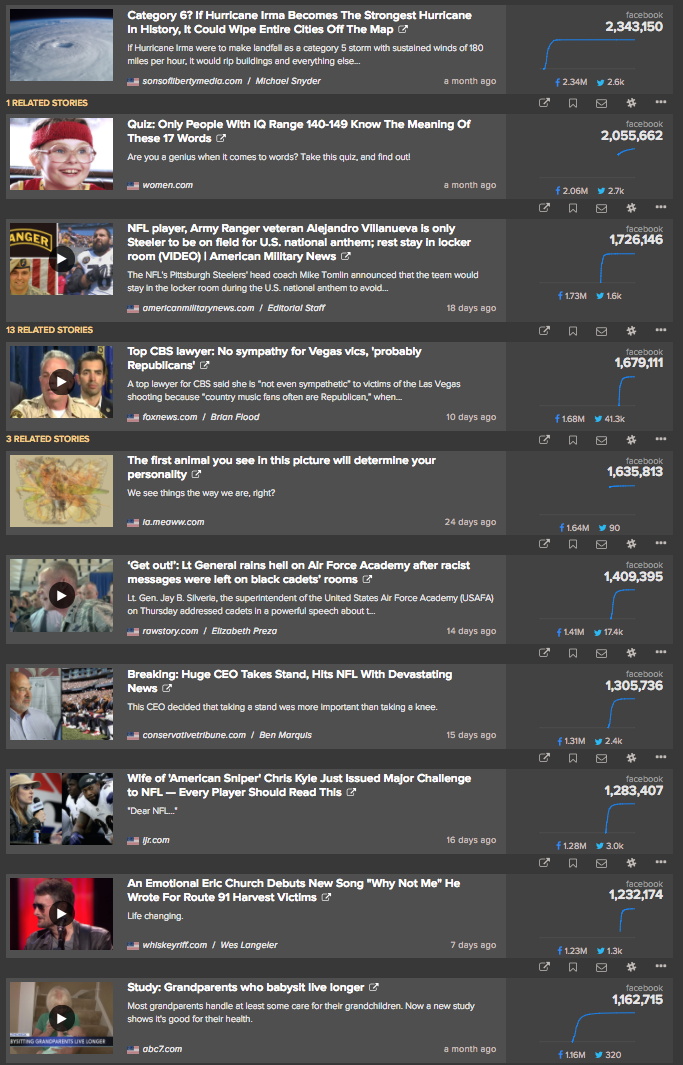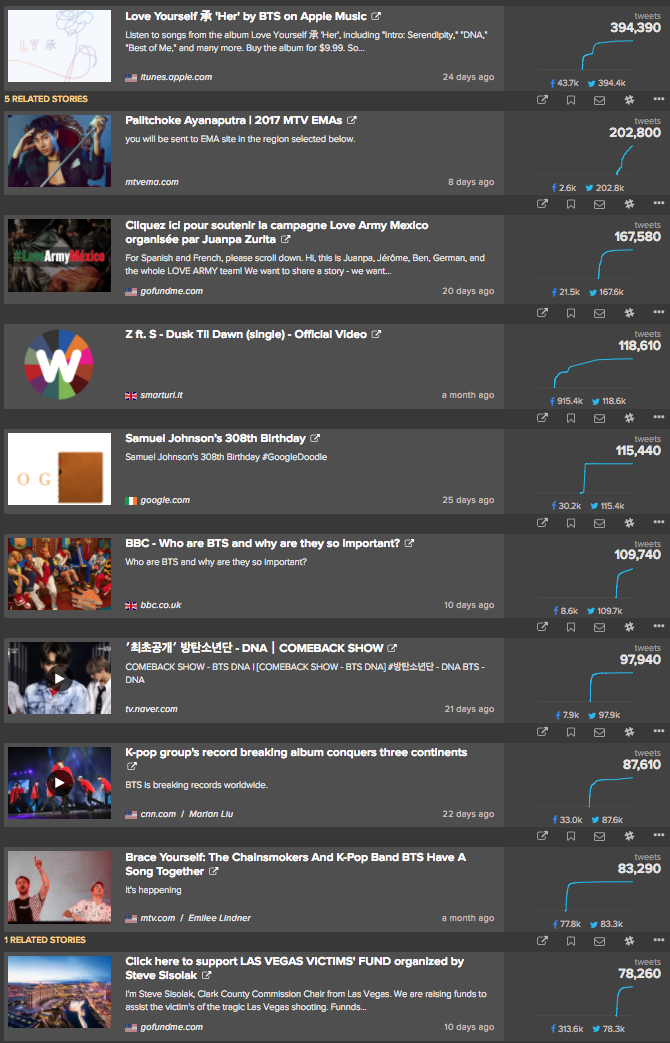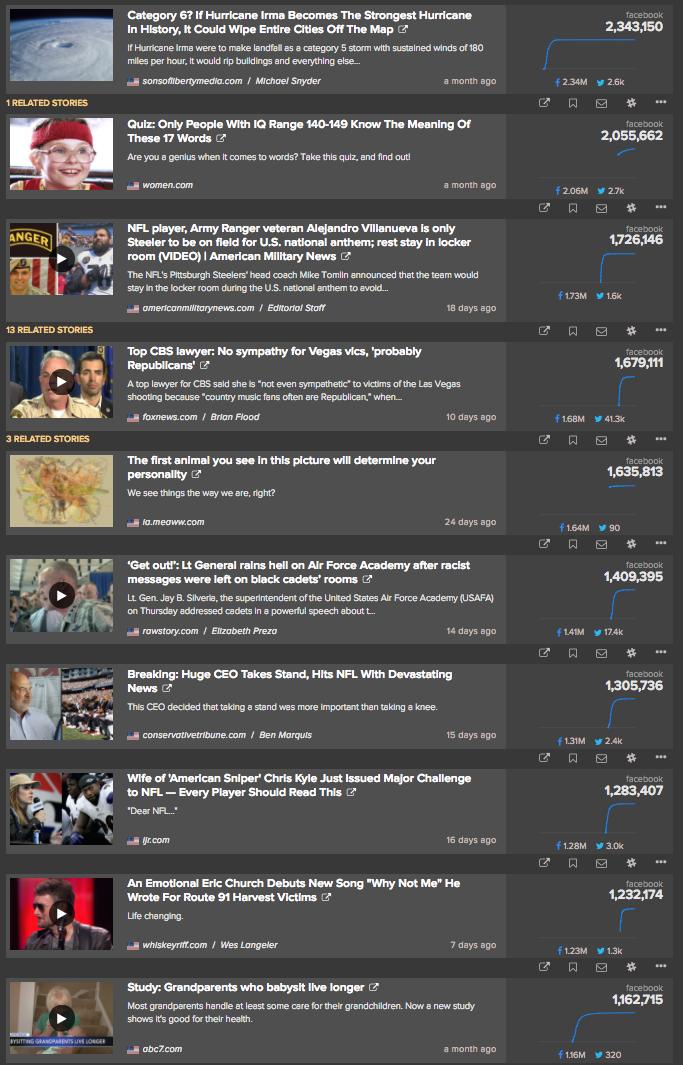Using Newswhip, a new social media monitoring platform, I was able to analyze the top-performing links since September 1 across four major social networks: Facebook, Twitter, LinkedIn, and Pinterest. Plenty of people get their news from social media. Since September 1, thirteen stories generated at least 1 million Facebook interactions; five came from conservative sites, one came from a liberal site, and the remainder lacked any overt political affiliation. Of the top eight links with the most shares on Twitter, five are about BTS. But from a social media lens, the unusual results can tell us a lot about Twitter: The platform has a deep identity crisis. Takeaway: Twitter has become a niche platform, which limits the ability of brands and publishers to go viral if their content doesn’t fall under certain categories or focus on certain topics. All users have the option of publishing content natively, which could cannibalize the impact of an external article or video link. All social networks want to prioritize native content since it keeps users engaged inside their walls. Takeaway: LinkedIn is a great platform for established influencers to communicate with an audience. For example, a lot of the successful food bloggers use a similar tone to introduce their recipes.
Like many news stories of late, this one started with a tweet from the president. On September 27, Trump fired off an accusation that Facebook had always been against him. Facebook CEO Mark Zuckerberg responded later that day with his own post, writing: “Trump says Facebook is against him. Liberals say we helped Trump. Both sides are upset about ideas and content they don’t like. That’s what running a platform for all ideas looks like.”
Both of them are wrong.
Over time, social networks start to develop their own reputations based on generalizations about who uses each network and what they tend to share. LinkedIn is tailored for the wealthy professional. Twitter serves witty media figures. Even if these interpretations have some truth to them, it’s hard to back them up or refute them. Look no further than Facebook, which has become a homebase for conspiracy theorists, great aunts, politically active friends from college, and over 2 billion people in between. At this point, users can portray Facebook any way that suits them.
But are these stereotypes really accurate?
Using Newswhip, a new social media monitoring platform, I was able to analyze the top-performing links since September 1 across four major social networks: Facebook, Twitter, LinkedIn, and Pinterest. My goal was to dig deep and examine if our general preconceptions about social media networks were correct.
Does one political party dominate Facebook? Is Twitter a media echo chamber? Has LinkedIn become the best place for thought leadership? And is Pinterest really free of any controversial content? Read on to find out.
Facebook: Do liberal or conservative outlets reign supreme?
Plenty of people get their news from social media. According to Pew research, 45 percent of all U.S. adults do so via Facebook. The issue, though, is how one defines “news.” While both sides of the aisle continue to be upset about bias and favoritism, Newswhip data suggests content from conservative media outlets is more popular on Facebook than content from liberal outfits.
Since September 1, thirteen stories generated at least 1 million Facebook interactions; five came from conservative sites, one came from a liberal site, and the remainder lacked any overt political affiliation.

Facebook has no systemic bias against Trump or conservative content. It’s also clear that Facebook isn’t surfacing all ideas with equal weight, contrary to what Zuckerberg implied in his post last month. This may not be intentional, but the platform’s algorithm and user demographics have allowed fringe right-wing sites like Conservative Tribune and American Military News to go viral over established news outlets.
As TechCrunch writer Natasha Lomas points out, “Facebook’s business benefits from increased user engagement, and made-up stories that play to people’s prejudices and/or contain wild, socially divisive claims have been shown to be able to clock up far more Facebook views than factual reports of actual news.”
Takeaway: All users should be wary of filter bubbles. But judging by this data, the biggest filter bubbles are shaded red.
Twitter: Is it really a media echo chamber?
Until I looked in Newswhip to see which stories generated the most tweets, I had never heard of the Korean boy band BTS. Secretly, though, they’re the biggest thing on Twitter right now. Of the top eight links with the most shares on Twitter, five are about BTS. The top result, which has received almost 400,000 tweets, is just a link to the group’s album on Apple Music. I’m no K-pop scholar, so I’ll leave the BTS analysis to someone more qualified. But from a social media lens, the unusual results can tell us a lot about Twitter: The platform has a deep identity crisis.


COMMENTS